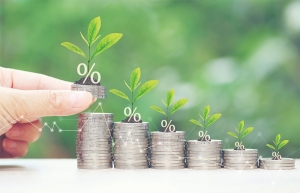Budding potential in green finance and AI
Green finance includes financial activities including loans, debt mechanisms, investments and fiscal policies such as environmental taxes or subsidies designed to improve environmental outcomes. Socially responsible investors can take advantage of green bonds, climate finance initiatives, and other financial instruments to fund carbon projects.
 |
| Ludwig Graf Westarp, researcher and lecturer TU Dortmund University |
In Vietnam, green finance has been declared necessary in implementing the green growth strategy, sustainable development, and reducing net emissions to zero.
Along with green finance, digitalisation is Vietnam’s highest priority. By 2030, the digital economy will account for 30 per cent of GDP. The country has set great expectations for economic development based on technology and digital data. Developing a digital platform is a solution for faster transformation, reducing costs, and increasing efficiency.
The green finance trend is growing and fintech is a pioneer with content such as green loans and sustainable finance, digital payments, e-signatures, green investment, carbon-neutral payment processing methods, and mobile payment solutions to offset carbon and environmentally friendly cryptocurrencies.
The adoption of environmental, social, and governance standards is crucial for Vietnamese banks to access international green financing for businesses. However, improving regulations, especially the green classification system, is needed to exploit these opportunities.
The application of AI and fintech has become an indispensable part of the long-term development of the global financial services industry. Mastering this technology helps to improve management processes, reduce admin procedures, as well as improve labour productivity. This does not only create opportunities for companies to improve their services but can also bring in greater revenue and higher profits.
However, Vietnam is lacking a legal framework as well as a team to develop AI. According to Google research, the potential of AI in Vietnam is huge, with an estimated benefit of up to $79.3 billion for businesses by 2030 if AI is widely applied. This is equivalent to nearly 12 per cent of Vietnam’s GDP by 2030.
The market is facing a serious shortage of personnel, especially in specialised positions. Universities have training programmes on fintech, but presently attendees are only students, and it will take a few years to have more engineers.
The application of AI in the financial sector, especially green finance in Vietnam, also faces numerous other challenges. Specifically, green finance data is currently not available. Hence, there is no input data to apply AI in green finance lending.
Currently, commercial banks are also having difficulty determining which projects are “green” to invest in because Vietnam does not have general regulations on the Green Classification List in accordance with economic sector classification and international practices.
For the accurate assessment and verification of carbon credits, for instance, reliable data is crucial. A limited availability of high-quality as well as transparent data can affect the monitoring of carbon projects. Inadequate data can also complicate the calculation of carbon credits and reduce the confidence of investors.
An additional challenge is that Vietnam still does not have a legal system that regulates AI, especially in sensitive areas such as finance. For example, banks applying AI recommend green financing, but when risks occur, who is responsible? There needs to be a relevant law and legal framework.
The application of AI in green finance needs caution, and there must be a strategy to ensure network security and data safety because AI is a new field, which needs to be carefully managed to avoid risks.
To deal with these risks, it is important to establish national regulations for a green classification system in line with existing industry standards, create policies to promote the carbon market and accelerate the official launch of the carbon credit trading platform in Vietnam.
To facilitate the cooperation between the Ministry of Natural Resources and Environment and relevant agencies to develop and implement environmental criteria for green credits is also crucial as well as to maintain the State Bank of Vietnam’s commitment to credit policies supporting green growth in banking.
Technology plays an indispensable role in developing green finance, creating innovative solutions to increase efficiency and minimise risks. Developing a carbon market in Vietnam is critical because it helps raise awareness about the impact of carbon emissions. Buying and selling carbon credits contributes to creating financial incentives to reduce emissions, create sustainable energy sources, green jobs and commit to protecting the environment.
Vietnam has many opportunities to draw in green finance, focusing on adapting to climate change, coping with extreme weather events, as well as reducing greenhouse gas emissions. Developing green finance and ensuring the sustainable development of Vietnam’s economy is necessary, especially amid pressure from air pollution and flooding in the major cities.
The country must continue to invest in infrastructure and innovation, AI research and development, and digital infrastructure. It is crucial to continue inclusive adoption and accessibility, harnessing AI across the government and all sectors to ensure the benefits are widely shared.
 | Lenders seek regulations to disburse green finance Many banks are increasing their focus on implementing green finance packages, but unlocking these promising capital sources still requires suitable mechanisms. |
 | Companies must embrace green finance initiatives Green and digital transition is an inevitable process for all businesses, despite the challenges it presents. Vu Minh Tien, vice chairman of VIAD Group, spoke with VIR’s Huong Duong about how to seize on the transition and overcome obstacles through carbon credits and greener financing. |
 | Green policies and practices: catalyst or challenge Developing countries face significant challenges in aligning with green policies as they navigate global trade and investment pressures, international experts said at the Conference on International Economic Cooperation and Integration (CIECI) 2024. Held at the University of Economics and Business in Hanoi on November 22, the event focused on the theme “Green policies and practices: Catalyst or pressure for trade and investment”. |
What the stars mean:
★ Poor ★ ★ Promising ★★★ Good ★★★★ Very good ★★★★★ Exceptional
Related Contents
Latest News
More News
- Private capital funds as cornerstone of IFC plans (February 20, 2026 | 14:38)
- Priorities for building credibility and momentum within Vietnamese IFCs (February 20, 2026 | 14:29)
- How Hong Kong can bridge critical financial centre gaps (February 20, 2026 | 14:22)
- All global experiences useful for Vietnam’s international financial hub (February 20, 2026 | 14:16)
- Raised ties reaffirm strategic trust (February 20, 2026 | 14:06)
- Sustained growth can translate into income gains (February 19, 2026 | 18:55)
- The vision to maintain a stable monetary policy (February 19, 2026 | 08:50)
- Banking sector faces data governance hurdles in AI transition (February 19, 2026 | 08:00)
- AI leading to shift in banking roles (February 18, 2026 | 19:54)
- Digital banking enters season of transformation (February 16, 2026 | 09:00)

 Tag:
Tag:


















 Mobile Version
Mobile Version